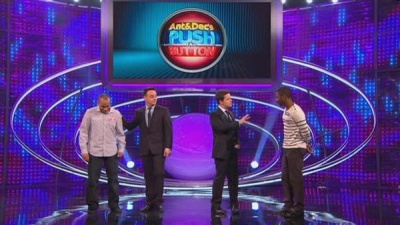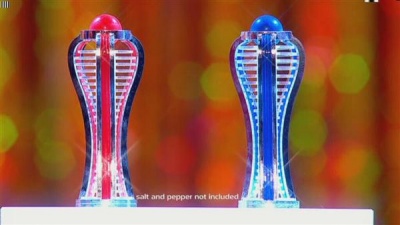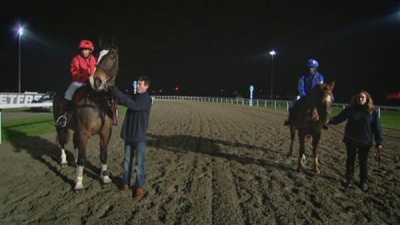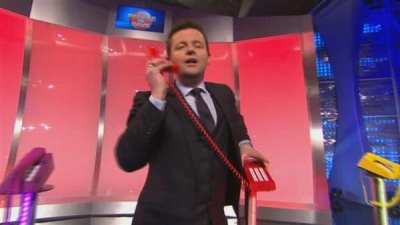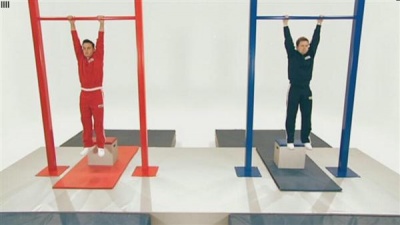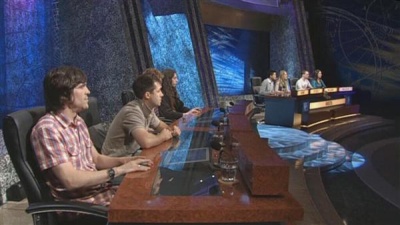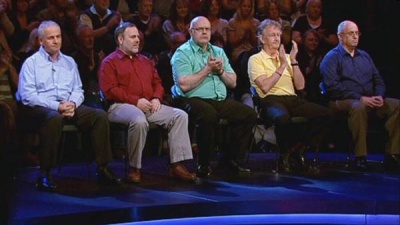Weaver's Week 2011-03-06
Last week | Weaver's Week Index | Next week
Coming up, the latest in University Challenge's ceaseless quarter-finals, high scorers in the first Mastermind semi-final, and which show might follow Come Dine with Me as the RTS Daytime Show of the Year. But first, we have a button to push.
Contents |
Push The Button 2.0 Live
Gallowgate for ITV, Saturday evenings
Last year, Ant and Dec gave the world their new game show, Push the Button. It was a simple show: families of five were visited by bona fide pop stars, asked to turn up at ITV's studios, given a lukewarm custard cream and a stale cup of tea, and then had their money taken away from them via a series of tests. It certainly looked like fun for the participants, and the people in the audience had a lovely time, but this wasn't quite reflected in the programme on television.
After the series, the hosts and producers (that's the same people) asked themselves what went wrong. Was it that the games were spectacle for spectacle's sake? Might it be that the opening to the programme was tedious and prolonged? That a few too many corners were cut?
No, no, no. The problem of Push the Button's first series is that it was recorded. Taped. Made on Thursday and transmitted on Saturday. Clearly, everything would be far, far better if only the programme went out live. People would be singing this programme's praises from the rooftops, they would be comparing it to Bruce Forsyth and the Generation Game, the germ of promise would sprout into a veritable thicket of light entertainment brilliance. Or something like that.
So, what's this new series got that the old one hasn't. It's live television, folks, and anything can happen. Literally, anything. One of the contestants might walk off his mark at an inopportune moment. Ant might stand to the left of Dec. The computer might spew out a slightly incorrect answer. The studio could be invaded by the Light Entertainment Revolutionary Vanguard, insisting that ITV keep this pair on air and not show Take Me Out afterwards.
All of this could happen. Very little of it actually does. Instead, it feels as though the production crew have taken what they had last series, put it into a lucky dip, and pulled out about two-thirds of the elements for re-use here. So gone is the visit to the families at home, and one of the family members, but the teams of four still sit on oversized sofas. Gone is Ronnie Corbett's distinctive voiceover, replaced by an identikit Booming Announcer (But Not The One Who Declaimed "Mission On"). Gone are the guinea pigs who tested out each game, but the consolation prize of salt and pepper shakers remain.
The first 45 minutes of the show comprises three rounds, which can be taken in almost any order. One round is a test of how well the players know their popular culture. In the opening episode, this consisted of Ant or Dec putting up some props, which were meant to be a rebus to a well-known popular song. So, for instance, if someone put up a toilet with a glass of liquid on top, that would be water on a loo, so the song would be "Waterloo". Already, the programme was trading on past glories – we half-expected to see the infamous horse with one leg missing, and Dec getting seriously annoyed with participants who couldn't see that this was a wonky donkey. Maybe he's getting more mature, maybe it wouldn't be good to shout at contestants live on national television, but there wasn't as much passion in that round as there might have been.
Another round involves some guests to the studio. There's been the Push the Button Brass Band, there's been the Push the Button Bald Squad, both of whom were subjected to an identity parade to work out people fitting a various category. Another game featured some mildly famous people (how mildly famous? Radio 1's resident goody-two-shoes Fearne Cotton was involved) playing against the contestants in a category quiz.
The third round in the first part of the show is a pre-recorded challenge, usually involving some sort of ITV cross-promotion. We've had members of the teams performing for the Dancing on Ice audience, we've had people strutting their stuff on the The X Factor Live tour. Though everyone knows that they've done their work, no-one knows how they've scored until the night.
Each of these challenges falls into its own part of the show, separated by a commercial break. With introductions and recaps and plugs for the call-and-lose contest, it means there still isn't a huge amount of game. Worse, the programme feels like it's being dragged out to fit in more advertisements – though last year's version took forever to get going, once it did, the games flowed at an acceptable pace.
Three games in, and one of the families has a lead over the other. All that is completely ignored now, as it's time for a revival of The People Versus, Dave. Oh, sorry, that's The People Versus DAVE. In this context, "DAVE" is the Dynamic Audio-Visual Endgame that clearly has squatter's rights on the studio. The guinea pigs and one of the players goes, but DAVE stays? Oh dear. At the control desk is Ant, reading out questions, while Dec runs around, picking up coloured telephones, and generally acting like the cheeky chappie. Callers from home are asked an insultingly easy question, and could win the night's star prize of a Brand New Car. Or they could win something entirely average, like a pair of socks (used). They just don't know. We just don't care – this section is clearly in as an excuse for a premium-rate phone-in. Just so long as the producers aren't up to their previous jiggy-bankery.
After this spurious exercise in viewer interaction, it's back to the game proper, and the Accumulator round. In this, host Daniel Peake will ask a series of themed questions, of increasing ... what? Oh. Shame. Would have been more entertaining. In this, the families have to stake some of the money they've retained from the game on a series of challenges. The first, where the players can stake up to £5000, involves predicting the responses of one hundred members of the Push the Button studio audience on a hot-button question that's been dividing the nation this week. "Did Jason Gardiner go too far on Dancing on Ice?" asked the first week's poll. Some people said yes, some said no, but no-one was allowed to say, "Who will remember what Mr. Gardiner is meant to have said when we come to review this episode in three weeks' time, still less care?" One of these people will win £5000 for the closest prediction to the winning total.
For a stake of up to £10,000, there's a stunt involving a celebrity. Can a footballer kick a football over a three-bedroom semi? Can someone who we're assured stars in an ITV soap opera empty two soap dispensers in 30 seconds? And, for unlimited stakes, Ant and Dec face off against each other in a challenge of some sort. Who can park a stretch limo better, because goodness knows they've had enough experience of being driven around in them. The stunts individually are mildly diverting, and the round can (and often does) change the winning side, but we've been numbed by the slow pace of the programme so far.
It doesn't improve: if last year's final prize game looked like a game of Simon but actually wasn't, this year's final prize game looks like a game of Simon and actually is. One player is asked to remember series of notes, always of increasing length, ranging from three notes (for 10% of their final score) to one of nine notes (for the full amount). The winning team stays on to the next show, but unless they got half their prize, the car from The People Versus DAVE was the night's largest prize.
We can't fault the ambition of Push the Button. It's always been a show that tries to have something for everyone, and many of the games in the first half of the show are genuinely entertaining. But the programme never has much pace, and just fizzles out two-thirds of the way through – once the third ad break has begun, only the stunts in the Accumulator round are worth watching, and they'll not last for more than two minutes between them. Having the programme go out live might actually have been a retrograde step – the production requirements mean there are a lot of commercial breaks to dress the set, and we do think that it would flow better if some of these could be cut out.
Last year, we concluded by saying that somewhere in the heart of Push the Button is a great light entertainment show trying to get out. It's not escaped yet, and we fear that it never will.
University Challenge
Deci-final 8: York v Bristol
Where were we? York lost to Peterhouse Cambridge back on 17 January, Bristol fell to Queens' Cambridge two weeks later. The losers of this match are out, but the winners aren't necessarily in, they have to play against Christ's College Cambridge to make the final four. Mascot watch: Bristol have a teddy bear, and York have one duck on their stand, and it's next to an Easter egg. This may or may not be significant.
Homophones for "queue" allow York to draw first blood, but their knowledge of the London underground proves slim. York? London? Two hundred miles betwixt? They don't do much better on classic poetry, and Bristol find speeches to the Labour party conference little more fruitful. We just about understand where they're coming from on questions on words made by scientific symbols, but York sweep the board, and lead 55-15 when no-one can recognise the leading architects of recent years.
"The Faerie Queene" is an unfinished work? Tell that to Steve Punt, who was railing against this work on "The 3rd Degree" this lunchtime. Emperors of Rome help Bristol to take the lead, and artists who painted works in London extend it. Victorian poets for York, that's not going to help much; Three Sisters cuts the arrears to five. York retake the lead thanks to works played by Ashkenasi, and it stands at 100-85.
Bristol's modern linguist gets the starter about a term in that subject, and the sides are level. Louis XIV and scientific terms give York a 20-point lead. Bristol claw that back through perfect stillness and some operas, and emerge with a 5-point lead. But Carlos Acosta restores York's advantage; they can't really take advantage of questions on Canadian literature. Anagrams and words differing by accents is more fertile soil, and the second visual round – characters in Punch magazine cartoons from around 1900 – puts them ahead by 175-125.
Thumper spends a rather long time describing the Cyrillic letters that make up "Sputnik", Bristol get so bored the interrupt him, and fail to score on the rings of Saturn. York remember that there were 69 signatures on the death warrant of Charles I, and the second woman to have an element named after her. Famous people from Liége (yes, apparently there are some) give York another set of points, and their lead is up to 95. "Fear, uncertainty, and doubt" lift them into a three-figure advantage, and that's got to be Game Over.
Trouts are the next bonus round, then can anyone spell Gandhi? Bristol try, but put the "h" before the "a", and let York's mathematician score on classes of numbers in mathematics. Bristol finally get going with classes of Indo-European languages. At the gong, York has won it, 280-140.
Nine starters for Andrew Clemmo of York allowed his side to run away with it in the second half, the side had a very ordinary bonus conversion rate of 24/48. Lucinda Critchley had four starters in Bristol's cause, their bonus conversion was 13/24 and the side picked up the night's only missignal. Overall accuracy was 61/98.
Next week: Magdalen Oxford v Queens' Cambridge
Mastermind
Second round, match 1
It was the August bank holiday weekend when we began this trek to find Britain's mastermind, the best person at answering questions posed by a small-headed Welshman while sitting in a large black chair. Twenty-four episodes later, we've found twenty-four episode winners, and six runners-up who are invited back because their score was higher than that of many winners.
As last year, the semi-finals adopt a slightly different format from the heats: 90 seconds of specialist questions, two minutes of general knowledge; that's a reduction of 30 seconds in each round. We think that it's coincidence that the five contenders here come from a five-week span in autumn last year, and that three of the four highest-scoring contenders are here tonight.
Iwan Thomas is the first man back into the hot seat, this time facing Glamorgan County Cricket Club 1946-70. Founded in Cardiff in 1888, Glamorgan fared well in the Minor Counties league, and joined the First-Class ranks in 1921. They've won the county championship three times, and sent such legends as Tony Lewis and Simon Jones to play for the England national side. Wales doesn't have a national cricket side of any note. 10 (1) is the score, which isn't actually that bad for the round.
Nick Mills will discuss the Dark Ages in Britain 400-600. The period between the departure of the Romans and the unification of the English crown is described as the "dark ages", because they weren't as classically civilised as the preceding Roman era. Or because there weren't many written sources for historians to use. Anyway, the period had Mercia and Wessex and Northumbria, invading Vikings, invading Christians, the rise and fall of Alba, and Alfred inventing the oven thermometer. 9 (2) is this contender's final score. These 90 second rounds don't last long, do they?
Onwards, ever ever on. Bill Cawley has been reading on the Life and Times of Thomas Paine (1737-1809), a radical philosopher. He was born in Thetford, spent some years in Lewes, and moved to Philadelphia at the behest of Benjamin Franklin. There, he agitated towards revolution against the British, and laid the blueprint for a representative democracy. Returning to the UK, he wrote "The Rights of Man", an early draft of the various declarations of human rights. "The Age of Reason" was an attack on religion, for which he was excoriated by the church. 10 (0) is the score here.
Keith Nickless is next into the chair, he's discussing the Jack Reacher novels (1997-). Created by Lee Child, the books are about a former soldier who investigates murders, metes out justice, and generally ensures that the world is a better place. And inhabits a world where Aston Villa reach the semi-finals of the European League; we presume that Rapid Vienna is in the other half of the draw. 10 (0), again, the final.
Last up is Peter Reilly, with the television drama Our Friends in the North (1996). This was a nine part series depicting the varying fortunes of four friends. It covered three decades in their lives, from the mid-1960s to the mid-1990s. The series saw performances by Daniel Craig and Christopher Eccleston, both subsequently to play cult characters. Here's how to play the round, his combined error is one letter and the score's 14 (0).
Mr. Mills finished second on 12 November, when he took Rameses II; his score of 34 was top of the repechage board. Dickie Bird gets him off to a good start, and this veteran of 2009's Only Connect is asked after the Greek letter epsilon. There's a nod to the Sheriff of Nottingham, to The Wasteland, and to Michael Faraday. And there's more: the location of Oxford Street, the '49ers, and the bunny killed in "What's Opera Doc?" The final score: 24 (4), which doesn't feel enough.
Mr. Thomas won on 15 October, taking the subject of The Byrds, and his was the highest total of the first round. Since then, he's won three matches on the radio and been crowned Brain of Britain. The largest airport outside of London, the seabird and greedy person, the Charleston, the Danegeld, the entirely unfunny 1990s comedy The Brittas Empire, "Jude the Obscure" – all the answers add up. But there are errors late on, and the final score is only 21 (4).
Mr. Cawley had 20th Century American Presidents last time, on 22 October. The winner of last year's football world cup, Chelsea Clinton's husband, the Lipton yachts, the Hapsburgs, the Gander airport, and The A Team all crop up in this round, which never quite gets going, and ends on 19 (0).
Mr. Nickless was the winner on 12 November, having discussed Mott the Hoople. Winner and runner-up in the same game again? Curiousness. Phoenix in Arizona, a speech by Lloyd George, the singing career of Cilla Black, the Glamorgan hills all feature in this round, as does a suggestion that Mrs. Margaret Thatcher was around in AD 660. It takes a quite remarkable wrong answer to throw contender and host off his step, but that made it. The contender never quite recovers, finishing on 20 (0).
Mr. Reilly took the Grand National when he won on 29 October. He needs eleven to win outright. The oath taken by doctors, the plot of Miami Vice, the fathom, the speeding Campbells, dryads, the Treaty of Rome, and where to find St Mary's all feature in this round. The score ticks over, and the claim that Salieri poisoned Mozart takes him over the finish line. Not that the contender knows it, he keeps on answering and finishes on 26 (4).
So Peter Reilly, a history lecturer from Edmunstowe, progresses to the grand final.
This Week And Next
Nominations for the Royal Television Society's awards have been announced, and Former RTS Daytime Programme of the Year Deal or No Deal is up to regain its crown. The Million Pound Drop Live, The X Factor, and The Cube ensure the best Entertainment Programme is a game show, Ant and Dec are up for best Entertainment Performance for I'm a Celeb and Britain's Got Talent – though not for Push the Button v1. Their opposition includes Charlie Brooker, but that's for Newswipe so it doesn't actually count for this site. The Great British Bake Off is also up, in Features and Lifestyle Series. Winners will be announced on 15 March.
Ratings for the week to 20 February are in, and it's dancing all the way. ITV's Dancing on Ice finished with just over 8m viewers, Let's Dance for Comic Relief just under 8m. Secret Fortune scored with 6.2m, and Masterchef had 5.5m wondering just what this audition phase mullarkey's about. Over on ITV, Take Me Out closed just ahead of Push the Button 2.0 Live!, both on about 4.3m viewers; that's a loss of 1.5m viewers in one week for Push the Button. University Challenge was BBC2's biggest game show, 2.8m there, and 2.75m for Come Dine With Me.
On the digital channels, Celebrity Juice (1.375m) finished ahead of Got to Dance (1.285m) and More4's Come Dine With Me repeats (840,000). Tool Academy continues its bizarre decline, falling below 500,000 viewers from the heights of recent weeks. Trade Your Way to the USA (which we'll be reviewing next week) had 360,000 on CBBC.
Can i Gymru is the annual Welsh song festival (S4C, 7.30 Sunday). Radio 4 has two new series of comedy quizzes, Act Your Age (6.30 Tuesday) and So Wrong It's Right (6.30 Thursday). And if you like standing on your head, UK Good Food gets Iron Chef Australia (10pm weeknights) and UK Watch gets Total Wipeout Australia (8.30 Friday).
To have Weaver's Week emailed to you on publication day, receive our exclusive TV roundup of the game shows in the week ahead, and chat to other ukgameshows.com readers, sign up to our Yahoo! Group.


